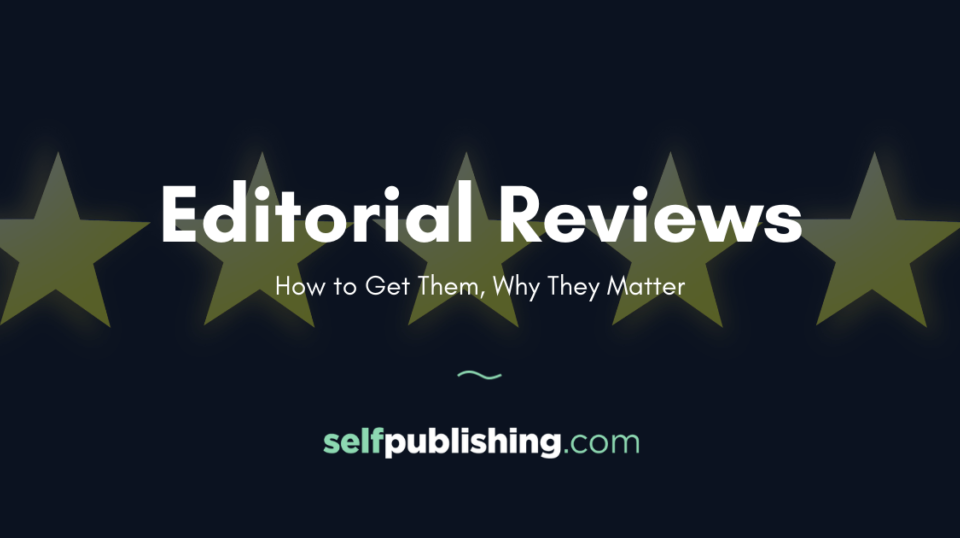Editorial Review: How To Get Them, Why They Matter
Reviews are an essential part of marketing, and editorial reviews are no less important. Reviews help you with your rankings, are a simple way to convert word of mouth marketing to social media, and provide credibility for your book. However, just as it’s difficult to make sales it can be difficult to get an editorial review. Getting those five-star reviews can help you immensely, so let’s talk about reviews in more depth.
In this article we discuss:
- What Is An Editorial Review?
- How To Get An Editorial Review
- Do Editorial Reviews Cost?
- Why Editorial Reviews Are Powerful For Authors
Before we dive in, please note that reviews are important in and of themselves. An honest review that praises your book can be just the nudge a potential reader needs to purchase. Editorial reviews are a bit different than your average review and we will discuss why. For a deeper dive into editorial reviews, how to get one, and why they are such a powerful tool, keep reading.

What Is An Editorial Review?
According to Tough Nickle, “An editorial review is an objective, third-party review of a book, by a professional editor, columnist, critic, or other authority in the book’s genre or topic.” To break it down, an editorial review is a bit more nuanced than an average review.
Author Jane Friedman says, “Pretty much anything and everything is allowed in the editorial reviews section. That’s because editorial reviews and customer reviews are two completely separate things. Customer reviews are written by people who have bought your book and is thus a fiercely guarded component of Amazon. Whereas editorial reviews are written by people who’ve received your book and agreed to do a review for you.”
If someone leaves an editorial review, they’re likely more familiar with the topic of your book. If you write a book on your personal journey to healthy living, someone in the medical field could leave an editorial review. They are well versed in the topic, have a genuine interest, and are equipped to leave a review with more insight than the pleasure reader.
An editorial review can also act as a type of endorsement. If a big-name author or an expert in the field of your genre leaves an editorial review, this will likely garner the attention of potential readers.
For instance, if Jane Smith leaves a glowing editorial review of your young adult dystopian, readers will be encouraged to give it a read. However, if Veronica Roth (Divergent) or James Dashner (Maze Runner) leaves an editorial review on your book, readers will view it through a different lens. Both these authors are credible in the young adult genre, have sold many books, so their reviews carry a bit more weight* than the average reader’s.
*While editorial reviews provide more credibility to a book, customer reviews are still helpful and should be pursued. Each type of review has a different purpose and is important in different ways.
Similar to an endorsement, an editorial review will likely be done prior to the book’s release day or soon after the book is released. Editorial reviews can also be a placeholder for customer book reviews, which are not eligible for posting until release day.
An editorial review is also objective, so while customer reviews may show bias, editorial reviews should not. Keep this in mind as you consider who you want to leave an editorial review. That said, let’s move on to the how of getting editorial reviews.
How To Get An Editorial Review
First, consider who you want to leave an editorial review. Research books you love and look through their reviews. Is there a particular review that sticks out to you? Look the person up. Is there a certain author you love? Reach out. Don’t flatter them, but communicate that you enjoy their work and would be honored if they would leave an editorial review for your book. If they agree, don’t forget to send a free copy or PDF version. Pursue editorial reviews in much the same way you pursue blurbs.
Goodreads, TikTok, Instagram, and Twitter are great places to find like-minded individuals who have a substantial following. Browse through hashtags and following lists to find influencers who represent the type of book you’ve written. Engage with them (don’t be spammy) and reach out. Don’t be afraid if someone says no or doesn’t respond. The important thing is you’re trying. The more people you ask, the higher your chances of getting a yes.
If social media doesn’t get you the responses you hoped, don’t forget about author websites. Many authors have a contact form or their agent’s email listed. Query, and respectfully, in a concise way, explain who you are and what you are asking. Don’t pressure them, but don’t be afraid to ask.
Speed Up The Process
Ideally, you will have a substantial list of potential editorial reviewers. While you definitely want to personalize your messages to the individual, creating a generalized template can be a big time saver when it comes time to craft your queries. You can create a generalized template to work from, then customize it per individual.
Create your greeting, briefly explain why you respect their work, introduce who you are, what your book is about (an elevator pitch is a concise way to explain it), make your request, and leave your name.
Below is a rough template to get you started:
Hello [Name],
My name is [author name] and I enjoyed your book [Title]. The [insert details] […].
[Your Book’s Title], my [debut novel or nonfiction] releases [date]. It is about [elevator pitch].
I would be honored if you would leave an editorial review.
Thank you for your consideration,
[Name]
Work from this template, or create your own, to speed up your process in solidifying your editorial reviews. Don’t forget to include a compelling subject line!
Do Editorial Reviews Cost?
The cost of an editorial review is dependent on the reviewer. Chances are, you know other writers who would be happy to write up an editorial review at no charge. However, there is also the possibility that a well-known author or successful influencer would also write a review for a fee.
At this point, it’s crucial to ask yourself if you’re comfortable paying someone to review your book. While this is considered ethical in the publishing world, it is always the best policy to include honest reviews. While those honest reviews may come at a cost, it is important to make sure your editorial reviewer leaves a non-biased review, whether they are doing so at no charge or for a fee.
Obtain Written Permission
As you collect your editorial reviews, be clear about where and how you will share the review. Make sure you have their written permission to use their review and you’ve followed the guidelines exactly. Consulting a professional who works in this field is an invaluable step before making your editorial reviews public.
Choose Where Your Editorial Reviews Go
Editorial reviews can be used on the book itself or in a myriad of other places. Newspapers, Amazon product reviews, Amazon book descriptions, your author website, your book funnel, a blog promoting your book or your newsletter, your social media, ads, and other marketing options are all places to share editorial reviews.
Choose Which Review Gets The Best Real Estate
While all positive editorial reviews are helpful in their own way, there are differences in each review. These should be taken into consideration when brainstorming the best place to put each review. If you obtained a review from a celebrity or influencer, you may want to put this editorial review on the front cover of your book. Why you don’t want to cover the front of your book with reviews, the back cover is a great place for reviews you don’t want to go unnoticed. Consider the reviews of lesser-known authors, readers, or professionals in the field for the places mentioned previously.
Wherever you choose to place your reviews, give them substantial thought and consideration. A well-placed editorial review could grab the attention of that potential reader’s eye and help them make the purchase.
Why Editorial Reviews Are Powerful For Authors
Editorial reviews are powerful for authors because they establish the credibility of your book in a non-biased way. Customer reviews are often subjective, based on the reader’s interpretation of your work. If they did not particularly like your writing style they may leave a poor review. This does not mean that you are a bad writer. It simply means they did not resonate with your writing in the way you hoped they would. It also does not mean that another reader will not absolutely love your book and leave a glowing five-star review.
The power of editorial reviews comes from their non-bias. An editorial review will often be more thought-out than a general customer review and reflect the thoughtfulness and nuance of the reviewer. After all, an editorial review is often left by an expert in the field in which you write. Take note that the term expert in regards to an editorial review is not always the same as the definition in the professional world. While most anyone can leave an editorial review, typically, an editorial review is considered more professional than a customer review. However, all well-crafted, complimentary reviews are helpful to market your book.
Hope For The Best, Expect The Subjective.
Just like customer reviews, editorial reviews are subjective. While editorial reviews are known for being non-biased, any review is likely to be subjective in some way. As you receive your editorial reviews, don’t be discouraged if they are not phrased exactly how you had hoped. Every writer has a different way of reviewing books and it’s unlikely your editorial reviewers will do so in the exact manner you expected. You do not have to use every review that comes in, but remember, editorial reviews are subjective. A variety of well-crafted reviews will likely resonate with a variety of potential readers.
As You Start Your Customer Review Journey…
The more invested you become in the writing industry the more you will realize how small it is. Writers know writers who know writers who know writers. This should be encouraging as you pursue reaching out to editorial reviewers. Keep in mind that if you ask somebody to review your book you may be asked to review their book in the future. Of course, not every reviewer who reviews your book will ask for the returned favor, but keep this possibility in mind as you reach out.
Enjoy connecting with different individuals and conversing with them about your book. You spent a long time writing it and now you get to spend time talking about it, getting others talking about it, and promoting it. Congratulations, and well done!


